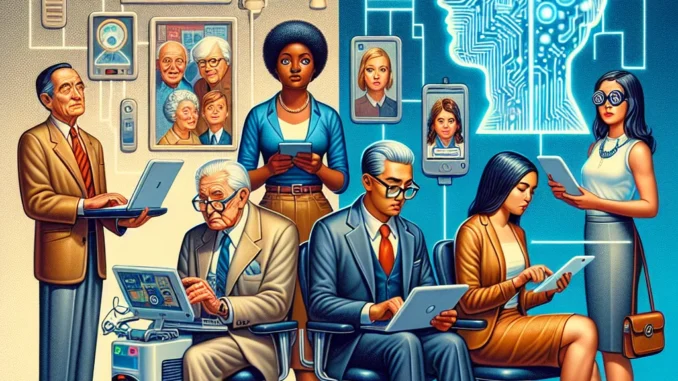
How AI Is Creating a New Generational Divide: Boomers, Millennials, and Gen Z React Differently
Artificial Intelligence (AI) is everywhere right now—it’s in our phones, our workplaces, and even helping us write emails. But while it’s shaking up industries and streamlining tasks, it’s also doing something unexpected: exposing a major generational divide.
From Baby Boomers to Gen Z, everyone has their own thoughts on AI. Some are excited. Others feel uneasy. And if you ask around, you’ll notice quickly that not everyone’s on the same page. Why is that? Let’s dive into how each generation is responding to this wave of new technology—and what it means for the future.
Why Is AI Stirring Up So Much Buzz?
AI has come a long way. In just a few short years, programs like ChatGPT and image-generating tools like Midjourney and DALL·E have gone from niche tech toys to everyday tools. Anyone with a phone or laptop can now get AI to help with tasks like:
- Answering emails
- Organizing calendars
- Writing reports or blog posts
- Creating art and music
But with all this power comes uncertainty. Will AI replace jobs? Can we trust what it creates? And how does each generation feel about working alongside it?
The Generational Gap: Who’s Embracing AI—and Who’s Not
Everyone’s facing the same technological wave, but we’re all reacting differently depending on our age and work experience. Here’s a breakdown of the generational differences when it comes to AI adoption:
Gen Z: The AI-Natives
Born roughly between 1997 and 2012, Gen Z grew up with smartphones and social media. So it’s no surprise they’ve been quick to jump on the AI bandwagon.
- They’re using AI tools every day—from getting study help to dreaming up business ideas.
- They see AI as a tool, not a threat.
- They’re even learning how to “prompt” AI more effectively, treating it like a skill worth mastering.
One college student in the article put it well: “We were raised with this technology. Using it feels natural.” For Gen Z, AI isn’t some scary unknown—it’s an exciting opportunity, and maybe even a creative partner.
Millennials: Excited, But Cautious
Millennials (those born between 1981 and 1996) often sit in the middle of the tech spectrum. They were kids during the rise of the Internet and are now mid-career professionals adjusting to AI in the workplace.
- Many millennials see the benefit of AI tools at work—think faster emails, tidier calendars, and smarter data reports.
- But they’re also worried about job security. If AI can do their work faster, will companies need fewer people?
- Millennials tend to want training and oversight to use AI responsibly and effectively.
There’s optimism, but also uncertainty. For many millennials, it’s about finding a balance: using AI to make life easier, not harder.
Baby Boomers: Skeptical and Concerned
The Baby Boomer generation (born between 1946 and 1964) didn’t grow up with digital tech. For many of them, AI feels like uncharted—and sometimes unsettling—territory.
- They’re concerned about the pace of technological change.
- Many boomers don’t feel confident using AI tools.
- They worry AI might devalue human experience and jobs.
In the article, one manager expressed frustration: “We’ve adapted so much already—do we really need to keep reinventing the wheel every few years?” It’s a valid point. For a generation that’s seen the shift from typewriters to tablets, the constant change can feel exhausting.
Why Understanding This Divide Matters
This generational split over AI isn’t just interesting trivia—it impacts real workplaces, policies, and relationships. Here’s why we should pay attention:
- Companies need to tailor training programs for different comfort levels with AI.
- Younger leaders may approach AI-driven changes with more enthusiasm.
- Older employees risk being left behind—not because they aren’t capable, but because there’s a lack of support and clear guidance.
Like any major shift, empathy and communication are key. The goal shouldn’t be to “keep up or get out,” but rather to bridge the knowledge gap—together.
Is This Divide New? Not Really.
This tug of war isn’t new. Remember when email first replaced memos? Or when smartphones started showing up in meetings? Every generation has gone through a learning curve with new tech.
What makes AI different is how fast it’s moving—and how deep it can go. It’s not just changing the tools we use—it’s changing how we think, work, and create.
What Can We Learn—and How Do We Move Forward?
So, where do we go from here? Whether you’re a Gen Z student, a millennial professional, or a boomer executive, here are a few ways we can all approach AI with a more open mind:
- Stay curious. Try an AI tool like ChatGPT or Google Bard just to see what it can do.
- Be patient—with yourself and others. Learning new tech isn’t always quick.
- Share what you learn. If you figure out a cool AI trick, teach it to a friend (or your boss!).
- Recognize real concerns. AI does raise important issues about ethics, privacy, and jobs.
- Advocate for smart AI use. That means responsible training, company policies, and creative integration—not blind adoption.
The Bottom Line
AI is changing the world, and like most big shifts, it’s bringing people together—and pulling them apart. The generational divide we’re seeing isn’t about who’s smart or tech-savvy. It’s about familiarity, trust, and perspective.
Gen Z sees possibility. Millennials seek balance. Boomers want clarity.
Instead of letting AI divide us, what if we let it bring us closer together? Whether you’re 25 or 65, there’s a way AI can support your work and stretch your creativity—if we learn, share, and grow together.
So, what’s your take? Are you excited, skeptical, or somewhere in between?
Let’s talk AI—not just as a trend, but as a tool for everyone.

Be the first to comment